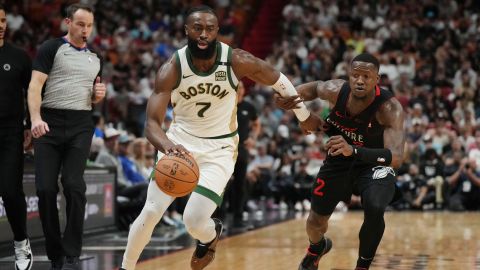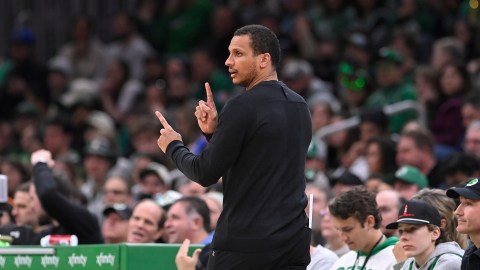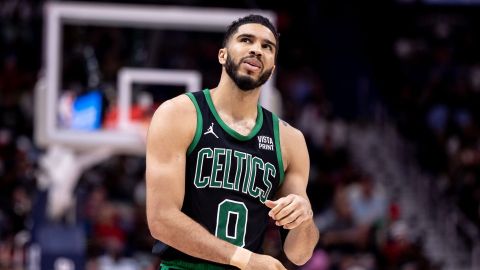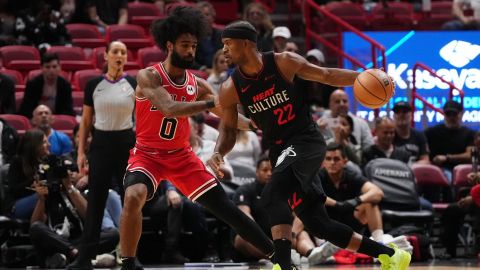 BOSTON — Ever since he became a key part of the Boston Celtics’ rotation, Phil Pressey has talked about the influence Rajon Rondo has had on his development. As fellow point guards, it only makes sense that the teammates occasionally put their heads together.
BOSTON — Ever since he became a key part of the Boston Celtics’ rotation, Phil Pressey has talked about the influence Rajon Rondo has had on his development. As fellow point guards, it only makes sense that the teammates occasionally put their heads together.
Yet Pressey doesn’t want to give the wrong impression. He’s not special. Rondo hasn’t taken any special interest in him because he plays the same position or out of pity for the undrafted rookie.
Nope, Rondo is that way with all his teammates, Pressey said. And that is what makes Rondo so invaluable.
“He’s always telling somebody what they should be doing, what he sees,” Pressey said. “Whatever can help us win, that’s what he’s trying to do. That’s one of the biggest things I’ve picked up from him being our point guard, him being the leader of our team. He’s always talking, always communicating with his teammates and, if you look, you can see it helps us out a lot.”
This is the side of Rondo few outsiders see and that many people miss when they insist the Celtics would be best off trading Rondo. The calls to ditch the All-Star point guard have grown into a cacophony this season, with the Celtics plummeting toward the bottom of the standings and near the top of the draft lottery board. If dealing Rondo could facilitate losing, bring back a healthy package of picks or both, the logic goes, Celtics president of basketball operations Danny Ainge needs to dump Rondo just as ignominiously as he dumped Kendrick Perkins, Paul Pierce, Kevin Garnett and — almost — Ray Allen in years past.
Clearly, the Celtics have thought about it. Ainge has admitted to considering a swap of Rondo for Chris Paul several years ago and the numerous reports about Rondo being on the trade block aren’t coming out of thin air. (Well, some of them aren’t.) The Ainge era’s epitaph will read: “No one is untouchable.”
If the Celtics plan to rebuild into something substantial, though, and not just into a nebulous “new era” that losing franchises like the New York Knicks and Charlotte Bobcats always seem to be chasing, they need to keep Rondo on board. Forget styles of play or symbols of the franchise’s last great team. Rondo makes the players around him — and, by extension, his team as a whole — better in ways that most observers will never perceive. But Rondo’s future in Boston has very little to do with his performance on the court and much more to do with the digits on his checks.
Before the Celtics’ game against the Oklahoma City Thunder on Friday, Rondo played shy when asked about the status of his contract. He is due for free agency in 2015, and Ainge said in a radio interview Thursday that the team had offered Rondo a contract extension. All Rondo would say about the matter is that he “wouldn’t mind being here the rest of [his] career,” which may be comforting to Celtics fans, but is also what every impending free agent says.
In weighing Rondo’s future worth, everything starts with the anterior cruciate ligament in his right knee. It’s the only variable that matters, since we know Rondo makes the Celtics’ offense run more efficiently (7.1 points better per 100 possessions in 2011-12, his last full season; 10.1 points better per 100 possessions the year before that) and that he’s less of a defensive drain than most top-flight point guards. Style of play doesn’t have much bearing, either; point guards as disparate as Tony Parker, Chauncey Billups, Derek Fisher, Jason Kidd, John Stockton and Gary Payton have played on NBA Finals teams in the last 20 years.
The key, if Rondo’s knee truly is repaired for good, is the players around him. And that hinges entirely on what sort of contract Rondo demands.
An extension is not happening. The backwards logic of the collective bargaining agreement punishes any player who wants to sign an extension by limiting said extension to four years, including any years remaining on the contract, with raises of no more than 7.5 percent per season. In other words, if Rondo were to sign an extension today, he could only re-up for two more seasons beyond 2015, when his current deal would end. If he waits until free agency, he can sign for five years at as much as 35 percent of the salary cap.
Brian Robb of CBS Boston did a great job outlining the financial parameters of Rondo’s situation and why the point guard would be a fool to re-sign now. Under an extension, Rondo would make just $13.9 million in the first extended year, the 2015-16 season. While that seems like a lot of money, it’s pennies compared to the roughly $22 million he could make as a max-level free agent in the first season of a brand-new maximum contract, according to Chris Forsberg of ESPN Boston.
Is Rondo worth more than $13.9 million, in the landscape of the NBA? Absolutely. Is he worth $22 million? That’s where it gets tricky.
The Celtics have to find a way to retain Rondo for enough money to keep him happy while reserving enough payroll to put the requisite scorers and defenders around him. All the oft-cited criticisms about his are valid; he gambles on defense, he doesn’t shoot well consistently and he tends to miss time every season for suspensions or injuries suffered as a result of his reckless style.
This doesn’t mean he’s expendable. It simple means the Celtics need a competent rim-protector to compensate for Rondo’s defensive risk -taking, a shooter to space the floor and a backup point guard capable of filling in for a game or three. Ainge’s ongoing love affair with Omer Asik, an outstanding interior defender, shows that the Celtics already are thinking along these lines.
The problem — not to mention the reason he’s such a fun player to speculate about — is that Rondo is harder to read than Faulkner. He shrugged off a question about making “star-level” money on Friday by saying he thinks he makes “star money” already. Perhaps that means Rondo feels he is already adequately paid and he would take a sizable hometown discount to stay in Boston, where Ainge could put the right pieces around him to chase another championship. Or perhaps Rondo was just messing with the assembled media in his dry way, as he loves to do.
Because a contract extension makes so little sense and probably won’t happen any time soon, Rondo and Ainge can just keep everybody guessing. It’s actually perfect that way, if you think about it. The player who knows what all of his teammates should be doing at all times is also the one player who nobody can figure out what he’ll do next. To the end, we’re all getting Rondo’d.
Have a question for Ben Watanabe? Send it to him via Twitter at @BenjeeBallgame or send it here.



